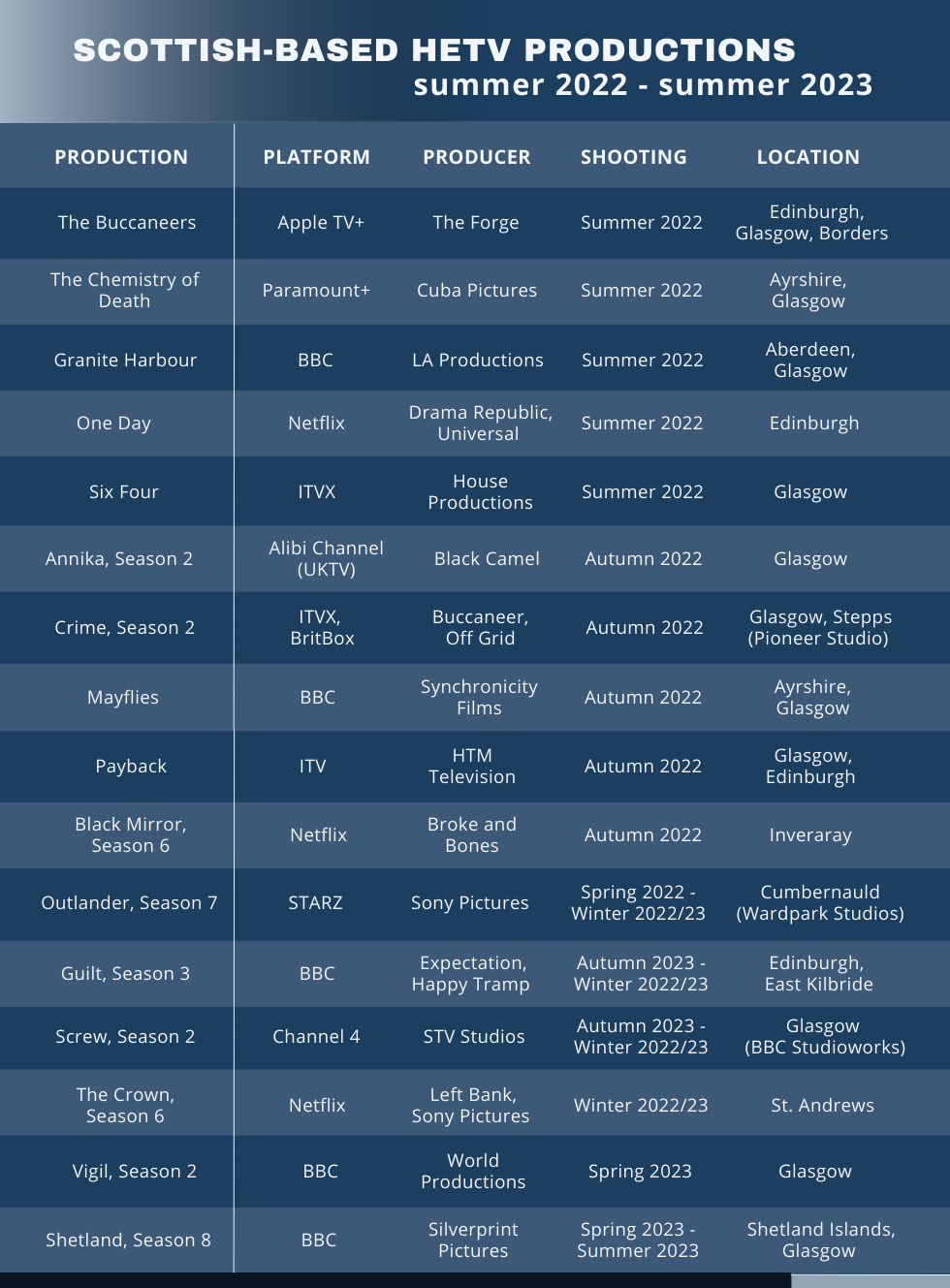Streaming Scotland: The Scottish Screen Sector in the Global HETV Production Market
Words by Nelson Correia
The year between summer 2022 and summer 2023 was key in cementing Scotland’s status as an international hub for the production of high-end television (HETV). After two unpredictable years due to COVID-19, the Scottish screen sector finally began to enjoy some level of post-pandemic normalcy by the middle of 2022. Since then, the country has hosted significant amounts of new and returning HETV productions, headed by global streamers and UK-based producers eyeing the international market.
The success of the HETV sector in Scotland comes as no surprise, given that television, more than cinema, has been the driving force of the Scottish screen sector since the emergence of the independent production model through the 1980s and 1990s. Scotland started to find its way into the global HETV production market in 2013, when the Sony Pictures and STARZ series Outlander set up base in Wardpark Studios, a converted filming facility in Cumbernauld, near Glasgow. As well as benefiting from the UK government’s HETV tax relief scheme, introduced in that same year, the project received additional funding and infrastructure investment from the Scottish Government, as part of a strategy aimed at attracting high-budget foreign productions to Scotland. The global success of Outlander, now in its seventh season, paved the way for many other incoming HETV productions over the decade since 2013, both series and streaming movies.
In the three years preceding the pandemic, screen production activity in Scotland hit record highs. BFI reports show that annual average production spend in Scotland 2017-19reached around £160 million, with HETV productions contributing more than half of this amount. While the same trend was reflected across the UK, growth in production spend in many English regions, for instance, was led by cinematic production.1
Lockdown restrictions, however, suspended and delayed productions throughout 2020. Then, in 2021 and early 2022, there was an unprecedented surge in filming activity in Scotland, especially from HETV projects backed by American networks and global streaming platforms, including series Anansi Boys and Good Omens 2 (both Amazon Studios/ Prime), streaming movies Tetris (Marv Studios/Apple TV+) and The Princess Switch 3 (MPCA/Netflix), and Outlander Season 6. However, many such 2021-22 projects were still catching up on previous filming disruptions, making future sectoral growth difficult to forecast.
Yet, after such backlogs were cleared by mid-2022, further inward investment-driven projects kept arriving in Scotland, with no signs of the arrival rate slowing down. The 2022-23 period has seen, for example: production of the series One Day (Drama Republic/Netflix), The Chemistry of Death (Cuba Pictures/Paramount+) and The Buccaneers (The Forge/Apple TV+); release and recommissioning of The Rig (Wild Mercury/Amazon Prime), the first Amazon Original series entirely shot in Scotland (FirstStage Studios, Edinburgh); and confirmation of an upcoming reboot of Ian Rankin's Rebus (Eleventh Hour Films) for the Swedish-based platform Viaplay, its first UK original series. In addition, there have been various announcements regarding Outlander, including: photography for Season 7, recommissioning of a final eighth season, and greenlighting of a prequel series, Outlander: Blood Of My Blood, by STARZ.
As for domestic HETV projects, 2022-23 was marked by the production of several Scottish-based crime series, both new and recommissioned, including: Six Four (House Productions/ITVX), Granite Harbour (LA Productions/BBC), Payback (HTM Television/ITV), Shetland Season 8 (Silverprint/BBC), and the second seasons of Annika (Black Camel/Alibi Channel), Crime (Buccaneer Media/ITVX) and Screw (STV Studios/Channel 4). Most of these productions have already appeared on streaming services worldwide, such as PBS Masterpiece, Amazon Prime, Netflix and Apple TV, as well as various national broadcasters’ schedules.
Thus, the Scottish screen sector’s economic value has arguably never been greater. National screen agency Screen Scotland estimates that film and TV production currently contributes more than £500 million per year to Scotland’s economy, and predicts that this figure may double by 2030.2 The agency’s promotion strategy to sell Scotland abroad is rooted in the availability of unique locations, skilled crews and world-class facilities. To support projected growth, Screen Scotland has also been offering funding to encourage HETV productions to set up base in the country, including one scheme specifically for television content and another for large-scale projects. Tetris, for example, is said to have accessed £500,000 to film with local crew in various Scottish locations, including Prestwick Airport, which was transformed into a 1980s Soviet air base for the production.3

Another recent Scottish response to growing production demand involved the September 2022 opening of a new large-scale television studio, BBC Studioworks, at Glasgow’s Kelvin Hall. Jointly funded by Glasgow City Council and the Scottish Government at a cost of £11.9 million, the multi-camera facility can accommodate a range of television genres and has already served as the set of prison drama Screw.4 BBC Studioworks is Scotland’s fifth large-scale permanent filming facility and the fourth such built in the Central Belt in recent years, following Pyramids Studios (Bathgate, 2017), FirstStage Studios (Edinburgh, 2020) and Pioneer Film Studios (Stepps, early 2022), in addition to Outlander’s previously established Wardpark Film and Television Studios (Cumbernauld, 2013).
Scotland’s newfound success in the HETV sector has also prompted further action regarding training and upskilling the local freelance workforce. The recent large influx of HETV production coincided with other major developments in the local screen sector, which combined have led to an increased demand for Scottish-based crews. These include the launch of a dedicated BBC channel for Scotland and the creation of a new Channel 4 creative hub in Glasgow (both 2019), along with the growing obligation on UK-wide broadcasters to place more out-of-London commissions.
As a consequence, labour and skills shortages have become evident across many production areas in Scotland in recent years. National skills agency Skills Development Scotland (SDS) estimates a current local sectoral demand for 500 to 760 new freelancers in addition to the approximately 3,400 existing freelance personnel.5 SDS identifies skills gaps particularly in craft areas, such as camera operation, grip, and editing, as well as in various art department roles, direction, and management positions across production departments. The shortage is such that many Scottish-based producers resort to recruiting staff from elsewhere. In early 2023, for example, online crewing platform The Talent Manager promoted a 'speed meet' networking event in London with recruiters from around a dozen Scottish indies hoping to lure experienced workers in certain production areas to relocate to Scotland.
There have been some initiatives for workforce upskilling and career progression training in Scotland in recent years through UK-wide agencies like ScreenSkills (the UK skills body for the screen sector), BECTU (UK’s media and entertainment trade union), and the Glasgow hub of the National Film and Television School (in operation since 2018). However, as pointed out by SDS, opportunities at these levels remain limited and are often difficult to access. In terms of recent entry-level training initiatives, ongoing schemes funded by Screen Scotland and Scottish-based productions, include the now-well-established Screen NETS programme, providing on-the-job training to 10 new entrants every year across technical and craft areas. The Outlander Training Programme is another successful initiative, which throughout the series’ seven seasons has offered training in numerous production, craft and technical roles for around 170 newcomers, the latest cohort of 33 trainees completing the programme in early 2023.67 In addition, many recent Screen Scotland-part-financed HETV productions have employed Scottish-based trainees as part of their public funding agreement. Screw, for instance, provided placements for a group of ex-offenders, aimed at furthering diversity in the local screen sector.
There is a shared understanding across the Scottish screen sector that continued levels of investment in both infrastructure and workforce training and development are fundamental to meet future national and international production demand and achieve long-term sectoral growth. Since HETV productions tend to require large crews, very specific skillsets, extensive facilities and forefront technology, the task of fulfilling their needs becomes ever more challenging. As the volume of Scottish-based HETV projects increases further, it remains to be seen how Scotland will find new ways to navigate the opportunities and challenges associated with maintenance of its current status as a HETV production hub and potential future evolution into a global powerhouse in this area.
About the Author
Nelson Correia is a PhD researcher investigating the development of the freelance film and television workforce in Scotland over the last half-century. His project is a collaboration between Edinburgh Napier University, the University of Edinburgh, and the National Library of Scotland Moving Image Archive, with a scholarship from the Scottish Graduate School for Arts and Humanities (SGSAH). He previously worked in broadcast journalism and factual television production.
Olsberg·SPI and Nordicity, Screen Business: How screen sector tax reliefs power economic growth across the UK 2017–2019 (British Film Institute, December 2021), https://core-cms.bfi.org.uk/media/15417/download.
Saffery Champness and Nordicity, Economic Value of the Screen Sector in Scotland in 2019 (Screen Scotland, June 2022), https://www.screen.scot/funding-and-support/research/economic-value-of-screen-sector-in-scotland-in-2019.
“Tetris,” Screen Scotland, accessed March 31, 2023, https://www.screen.scot/film-in-scotland/made-in-scotland/film/tetris.
“BBC Studioworks to Be Tenant Operator of New Studio Hub at Kelvin Hall,” Glasgow City Council, accessed March 31, 2023, https://www.glasgow.gov.uk/index.aspx?articleid=27763; “BBC Studioworks Launches New TV Studio in Glasgow’s Kelvin Hall,” Screen Scotland, September 30, 2022, https://www.screen.scot/news/2022/09/bbc-studioworks-launches-kelvin-hall-production-hub.
Skills Development Scotland, Scotland’s Screen Skills Research – Summary (Skills Development Scotland, June 2019) https://www.centreforworkbasedlearning.co.uk/media/1649/screen-report.pdf.
“Outlander Training Programme,” Screen Scotland, September 2, 2022, https://www.screen.scot/funding-and-support/research/economic-value-of-screen-sector-in-scotland-in-2019/case-studies/outlander-training-programme.
Article written before 2024 trainee programme commenced.







